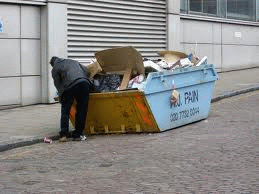|
Dumpster Diving
They say “one man’s trash is another man’s treasure”. Dumpster Diving is not limited to detectives and private investigators and industrial espionage. Frankly, many of us are guilty of not thinking about the information we handle each month and how we dispose of it. You’re not alone if you do this, however we want to help you beware of what you need to do with that information so that you don’t become another identity theft victim. Today once your place any information in your trash and place it at the curb for pickup any information that you have placed in the trash is “wide open and no longer private”. The facts and figures on this type of identity theft in general continue to be alarming. In the world of information technology, this type of identity theft is a technique used to retrieve information that could be used to also carry out an attack on a computer network. Dumpster Diving isn't limited to searching through the trash for obvious treasures like access codes or passwords written down on sticky notes. Seemingly innocent information like a phone list, calendar, or bills can assist an attacker to gain access to your personal information. To prevent dumpster divers from learning anything valuable from your trash, experts recommend that you establish a process where all personal paper and mail, including print-outs, is shredded in a cross-cut shredder before being recycled, all storage media is erased.
Could this happen to me?How lucky are you? • Say you’re paying bills at the end of the month, what do you do with the bills, statements or receipts? Do you save what you need for tax purposes and trash the balance? • You receive an application for “preapproved” credit cards, and you disregard and throw them in the trash. Some Identity Thieves love to go through the trash looking for these so they can use them to activate the cards for their use without your knowledge. Some of these can even be activated online. Another common ploy is to redirect your mail to another location and establish and alternate address. Criminals look for bank statements, copies of checks and utility bills. Frankly anything that can help them uses your identity for other purposes. So is there a fix this type of identity theft? Yes, we highly recommend the purchase of a good quality paper shredder and make sure you have destroyed any sensitive papers before you place in the trash each month. Doing this will reduce your chance of being a victim.
|
Free ID Theft Newsletter Subscription
Additional Identity Theft Articles
AARP - Earthquake Scam
AARP - Elderly Scam
AARP - Email Hoax
AARP - Fraud Protection
AARP - 2012 Fraud Scams
AARP - Social Media Twitter
AARP - Social Security Scams
Business - BBB Beware
Business - Is your Business at risk?
Business - ITC warns of Business Risk
Business - Small Business Prevent, Detect and Remedy
Business - Secretary of State Warns of Business Identity Theft







